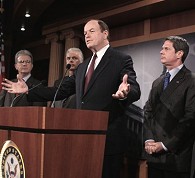voa标准英语2008-Auto Rescue Plan Nearing House Vote; US Deficit
搜索关注在线英语听力室公众号:tingroom,领取免费英语资料大礼包。
(单词翻译)
As Congress debates a multi-billion-dollar rescue plan for the U.S. auto1 industry, the government's budget deficit2 has reached record levels. |
| Sen. Richard Shelby, R-AL, center, accompanied by several Republican senators speaks to reporters on Capitol Hill, 10 Dec. 2008 |
The proposed $14 billion government bailout for Detroit's Big Three auto companies is moving closer to a vote in the U.S. House of Representatives.
Democratic Congressman3 Barney Frank of Massachusetts said the carmakers cannot be allowed to fail.
"This economy, which is already in trouble, would take a staggering hit if you had this kind of collapse," he said.
If the plan passes the House, it could face trouble in the Senate, where Republicans, like Bob Corker of Tennessee, said it does not go far enough to require the car companies to reform the way they do business.
"I always want to read the details, but based on what I know, I cannot support it," he said.
Corker and some other Senate Republicans believe a government rescue plan may not solve Detroit's problems.
"I have tried to offer a plan that keeps them from going into bankruptcy4, but I am beginning to believe that maybe the only way for them to do what needs to happen is through that process, which we have worked to try to avoid," he said.
The Bush administration is supporting the concept of the initiative, which would allow General Motors and Chrysler to receive government loans, and would eventually let Ford5 have access to government credit.
Meanwhile, the U.S. government has registered a record budget deficit. The Treasury6 Department said the deficit surpassed $164 billion last month, the largest federal deficit ever recorded for the month of November. Experts blamed the growing deficit on both the impact of the recession on tax receipts and the costs of the $700 billion financial rescue program.
European stock markets closed mostly higher Wednesday. The DAX index in Frankfurt was up half a percent, at 4,804, while the CAC 40 in Paris gained seven-tenths of a percent, to 3,320. London's Financial Times 100 was the only major index to fall, dropping one-half percent to 4,361.
Hong Kong's Hang Seng index surged 5.6 percent, to finish at 15,577. Tokyo's Nikkei 225 rose 3.2 percent, to 8,660.
China is reporting an unexpected drop in exports in November, as global demand plunged7. China's exports in November fell by 2.2 percent from a year earlier, which could mean more job losses, leading to further political unrest, and a deeper slump8 for the world's fourth largest economy.
And Russian Prime Minister Vladimir Putin has created an anti-crisis commission, to be led by one of his deputies, to develop a coordinated9 approach to economic and social problems. Plunging10 oil prices and sinking investor11 confidence are threatening the economic gains of Putin's presidency12.
Oil prices rebounded13 Wednesday, as a government report showed U.S. inventories14 were much smaller than expected. Crude oil for January delivery rose more than $3.50, or 8 percent, to $45.57 a barrel on the New York Mercantile Exchange.
 收听单词发音
收听单词发音 




